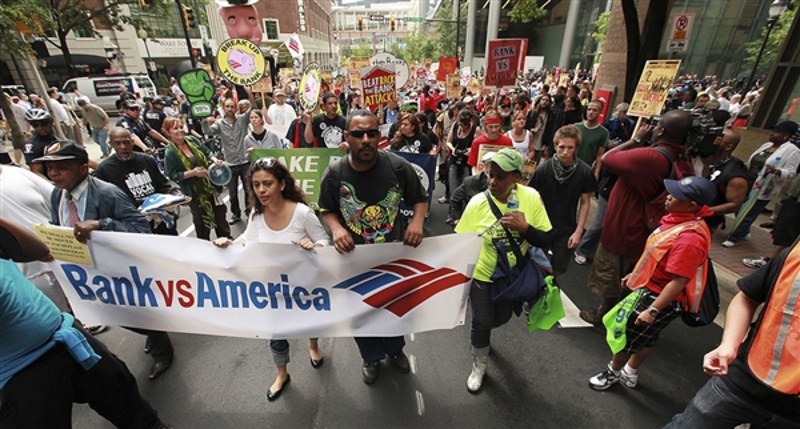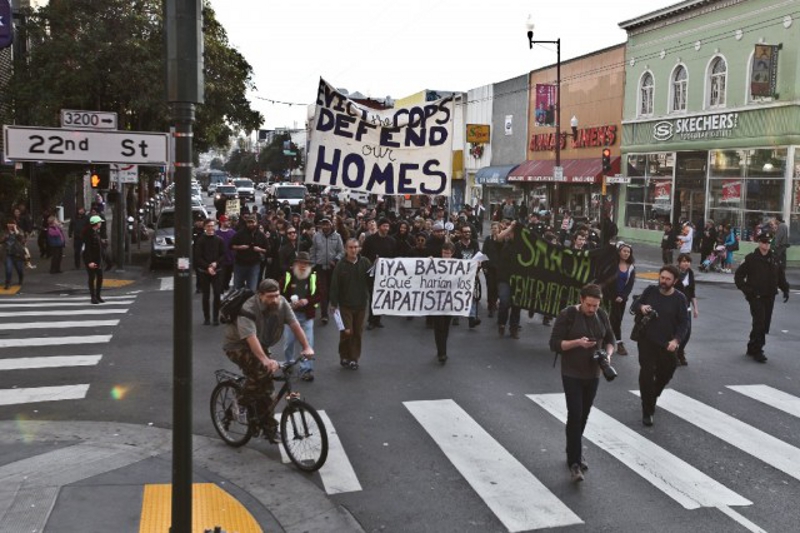Transcribed from This is Hell! Radio’s 22 February 2014 episode and printed with permission. Listen to the full interview:
“I thought maybe the banks are just as confused as we are. This is so sudden, so many houses underwater at once. But then Bloomberg did an article revealing that Bank of America was deliberately doing this stuff.”
Chuck Mertz: We’re speaking with Barbara Garson. She is the author of a series of books describing American working lives at historical turning points, including 2001’s Money Makes the World Go Around. Her latest book is Down the Up Escalator: How the 99% Live, which is out in paperback now with new material. Barbara also wrote the Obie Award-winning play The Dinosaur Door. Her most famous work, MacBird!, a 1966 counterculture drama and political parody of Macbeth, has been called one of the most controversial plays produced in the 1960s. Earlier this month, Barbara posted the TomDispatch piece The Public/Private Profiteers: If you want to play doctor, don’t hire an insurance company as your receptionist.
So Barbara, the general point of your article at TomDispatch is the Obama Administration’s over-reliance on private sector solutions for society’s problems. What explains this over-reliance, do you think?
BG: Well, I’m comparing the Affordable Care Act to Obama’s way of delivering mortgage relief—which was through government-subsidized programs in which the banks can do whatever they want, but he would give them a little money if they gave mortgage relief. And the reason was, of course, so that they wouldn’t oppose him.
And the reason in healthcare is: insurance companies take your premiums, they make profits, and one way they use these profits is: if anybody’s proposing healthcare reform that will cut them out of the picture, they mount a huge campaign with your premiums to stop “socialized medicine.”
So I assume that Obama decided, like every other president before him, that he would fail in extending healthcare if he didn’t cut the insurance companies into a deal. So he cut them in.
The answer is very simple: money. They had the money. You gave them the money in the form of premiums and they used it to get the kind of healthcare law they wanted.
CM: Our Question from Hell for our listeners this week was what bugs them the most about the Left. There were a lot of people who said the Left makes too many concessions, and there was another group of people who said the Left is too idealistic. Where would you stand on that?
BG: In each case you have to weigh what you can possibly do, and sometimes you err on one side and sometimes you err on the other. That magic time when everything goes right, that’s what we’re working for. Of course, the fact of the matter is that the people who are pushing for more are always essential in order to get anything. And the people who are negotiating the ‘anything’ are also essential in order to make the deal.
So in some sense it’s a matter of personality. All along the chain it’s necessary, so you go where your personality tells you to go, where you can have the most effect—whether you’re most creative at amassing big demonstrations, or you’re most creative at sitting through negotiations and coming up with a deal.
CM: When we had Mariana Mazzucato on the show (she’s the author of The Entrepreneurial State: Debunking Public Versus Private Sector Myths), she said that while she was for public/private partnerships, “the state cannot and should not bow down easily to interest groups who approach it to seek handouts, rents, and unnecessary privileges like tax cuts.”
BG: Well, look, Obama’s public/private partnership on mortgage relief, called HAMP: the banks used it not only to stall people off and make sure they didn’t get mortgage relief, but to discredit the government to boot. They may do the same thing with healthcare, actually discredit the government as they get the benefit of the government.
CM: Let’s talk about that. You write how, in the 1990s, “the conservative Heritage Foundation floated the idea of extending health coverage to more Americans via government exchanges or connectors that would funnel individual buyers to competing for-profit health insurance companies; in other words, let a hundred middle-men bloom. On the face of it, such a plan would seem expensive since it means supporting two bureaucracies, one of which would be obliged to take profits for investors, meanwhile doctors would still have the expense of trying to collect from multiple insurers with reasons to stall.”
That was back in the 1990s, and all sorts of people, especially in the Democratic Party, were against this plan. This is from the Heritage Foundation. What has happened since the early 1990s to change the Democratic Party from one that would definitely shun a proposal from the Heritage Foundation, when it comes to government health insurance, to one that embraces those ideas?
BG: Taking it at its best, you could say that Obama asked himself the questions that you asked me at the beginning: “Well, I want to actually do something. What’s my best plan?” And he seems to have decided: “I can deliver some more healthcare if I let the insurance companies take their cut. If I let them take 10 or 20% out of it, I’ll get healthcare. I’m paying the protection money.”
Now our job is to make it clear, as the thing unrolls—when they try to blame government for everything that goes wrong, we have to make it clear that private insurance companies are the ones stalling the payments to doctors and so on.
And there are states moving towards single-payer. The insurance companies will fight this just like they fought any public option in the national plan. We have the job of exposing the delays and pressures and so forth coming from the insurance companies. The main impediment to Medicare For All will be the newly-empowered insurance companies blaming problems they create on the government.
CM: So a couple of weeks ago you wrote about the HAMP—the Home Affordable Modification Program. For people who don’t know, what was HAMP supposed to do, and what did it end up doing?
BG: HAMP was supposed to subsidize banks so that they could give mortgage relief to people whose houses were underwater.
While I was writing Down the Up Escalator I was in California interviewing people who were trying to get their HAMP mortgages—what people in black communities called Obama Modifications. And it was taking not just months, but years. They kept being asked for the same information over and over; you would have to be a very good filler-outer of forms and a very patient person to stick with it.
I interviewed one man who was involved in bureaucracy before he lost his job—I mean, he was a bureaucrat! He wasn’t a radical type of person, but he said, “I think they may just be stringing me along until they foreclose on the house; they’re just giving me enough hope to keep paying.” He was emptying out his IRA and borrowing from his in-laws to keep paying the mortgage.
When I had finished writing the book, I thought, well, I don’t know, maybe the banks are just as confused as we are. This is so sudden, so many houses underwater at once. But then Bloomberg did an article revealing, five years later, that Bank of America, his bank, was deliberately doing this stuff.
They set up an office in Colorado. They hired a company called Urban Lending Solutions, and they called that office the “Office of the CEO.” When people like this man in California complained, they would make him think he was being moved up to the office of the CEO. They would “escalate” him—that was the word they always used—to the “Office of the CEO,” or sometimes to something called the “Hope Unit,” which would especially make black people think that it had something to do with Obama’s plan.
And it turns out that there in the “Office of the CEO”—by the way, Bank of America’s real CEO’s office is in North Carolina—they would deliberately request the same information in 30- to 60-day cycles. If you made official inquiries, as my fellow did—he went to the regulation board, he went to his congressman—if they got an inquiry from a congressman about why this was taking so long, if the inquiry were dry-signed—meaning it was computer-generated—they would answer with long pick-and-choose block paragraphs…he showed me the letters and we just laughed hysterically; they meant nothing—that’s how they would answer.
But if it was wet-signed, i.e. if someone had personally signed it—a congressman for example—then the people in these little offices were supposed to send it to the lawyer just in case they might be getting into some legal problems. They had the signatures of certain congressmen and senators up on the wall, like our senator Schumer, or the senator from Nevada. The idea was you should recognize their signatures. They had Harry Reid’s signature up, because if you got his signature, maybe he was on the case.
They were so duplicitous, so conscious. I found it very hard to believe at the time, even though I do believe it. These people are hired to take money away from us and give it to the banks, and they get up every day and go to the office and work long days doing it, and yet I am surprised that they had an actual duplicitous plan to make you think you were being reconsidered when you weren’t.
“With Occupy, we were so anxious not to put a brake on the movement, not to be like other movements, that we didn’t really leave any stable organization. Not even a daily newspaper. And surely the ‘60s should have generated a really fit, interesting, exciting radio network. And we didn’t. We were very bad at creating institutions that could support themselves without taking business money.”
In the black communities I went to, like Richmond, California—I heard a woman say, “does Obama know what’s going on?” It reminded me of the peasants that went to the Tsar with a petition, and the Tsar’s police fired on them, and they couldn’t believe that their little Father would do that. Then I heard a minister in the church explain that no, Obama wasn’t doing that to them…but that Obama was the “shepherd who delivered up a couple of our weaker members”—he said of his congregants—“to the wolves.”
They thought they were applying for a government mortgage modification, and the banks used this program to stall them along until prices stabilized, and at that point they could foreclose and turn the houses into—well, I don’t have to go into it, but instead of the old real-estate trusts, they are rental-housing trusts that would be securitized. That’s another story.
CM: We had Laura Gottesdiener on the show back in December to talk about how Blackstone is now making rental-backed securities just like the mortgage-backed securities. That’s something that’s taking place here in Chicago a lot—Invitation Homes is doing that a lot here in Chicago.
Barbara, I have one last question for you. As always it’s the Question from Hell, the question we might hate to ask, you might hate to answer, or our audience will hate the response.
You write, “the President offered those homeowners debt relief through banks. Now he’s offering healthcare through insurance companies. In both cases, the Administration shied away from direct government aid. Instead, it subsidized private companies to serve the people. To get your government-subsidized mortgage modification, you applied at your bank. To get your government-mandated health coverage, you buy private insurance.”
Is this bipartisan? There are some who are saying that TPP can be passed by Obama, in the same way that NAFTA was passed by Clinton, in that these things can only be passed by Democrats. If it were a Republican who was suggesting these kind of trade deals, the Democrats, the opposition, progressives would be up in arms. While it’s a Democrat in office, that doesn’t seem to happen. Can these trade deals only happen when Democrats are in office?
BG: Boy is that a good question. I don’t know. In other words, are you saying that the lesser of two evils can wind up to be the worse because they can do it and we would all be fighting the other guys? Sometimes that’s right. It might be true about trade deals. It’s probably not true about raising the minimum wage. I don’t know, that’s a great question. But I do know, as someone who came up in the ‘60s: our failure to create a third independent alternative is a very big failure for this country.
CM: I was just reading about how today’s activists should be listening to Vietnam-era activists because they at least have the experience from all of that work that they did in the past.
BG: We did do tremendous work…
CM: But at the same time, you were just saying that there was never a third party. Do you think that was a mistake by that generation?
BG: We should have had some kind of movement that had a permanent basis. We made the same mistake over again with Occupy. We were so anxious not to put a brake on the movement, not to have the cult of personality, not to be like other movements, that we didn’t really leave any stable organization. Not even a daily newspaper.
Look how hard you have to fight to maintain your unique radio show. Surely the ‘60s should have generated a really fit, really interesting, really exciting radio network. And we didn’t. And poor you, you’ve had to fight to keep your one station going. So no, we were very bad at creating institutions that could support themselves without taking business money.
I was the Socialist Party Vice Presidential candidate against the Clinton/Gore ticket, and NAFTA was mainly what I was campaigning against. If Clinton had taken my position on NAFTA, he would have been like me: speaking in public libraries and a few Green Party meetings.
So that’s the question. It’s the question you started with. How can I be most effective? And it’s hard to make that choice in a world where they can hardly hear me, I can’t buy the megaphone unless I’m being supported by—wow, it’s a hard question.
CM: Barbara, I really appreciate you coming back on. It’s always great hearing your voice.
BG: Bye!
Image: Protesting Bank of America’s annual shareholders meeting in Charlotte, North Carolina, in 2012. Source: Root Force





